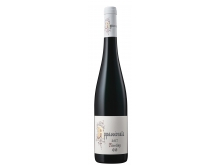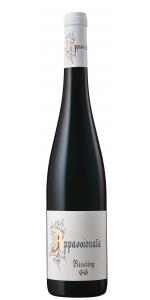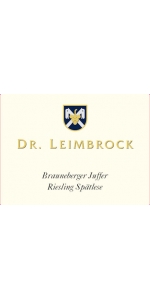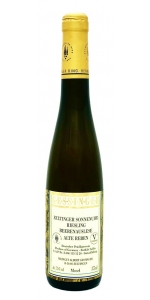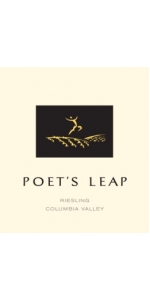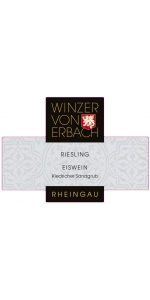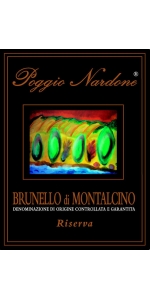Appassionata Riesling GG 2017
6 bottles with free shipping for: $330.00
12 bottles with free shipping for: $600.00
| BUY MORE! SAVE MORE! | ||||||||||||||||||||
|
| Country: | United States |
| Regions: | Oregon Oregon (Willamette) |
| Wineries: | Dr. Loosen J. Christopher Wines |
| Grape Type: | Riesling |
| Organic: | Yes |
| Vintage: | 2017 |
| Bottle Size: | 750 ml |
Inspired by the historical winemaking techniques of Erni Loosen’s great-grandfather, the Appassionata Riesling GG is made in the same way as the Dr. Loosen Grosses Gewächs (“Great Growth”) Rieslings he produces in Germany. The GG designation indicates a dry-style wine from a vineyard of special distinction — in this case, the old-vine Medici vineyard, planted in 1976. We farm this exceptional site, which is just a few miles east on the Chehalem Mountain ridge.
The fruit for this wine was harvested from old Rieslng vines (planted in 1976) in the Medici Vineyard, which is also in the Chehalem Mountains AVA, just a few miles from the winery. We lease this vineyard and have been farming it organically since 2015. The wine was fermented in a 3,000-liter German oak cask, and rests on the full lees for 12 months before bottling. The extended lees contact allows the wine to clarify and find its own harmonious balance naturally.
Production notes:
Whole-cluster pressing; natural fermentation in a neutral 3,000-liter oak cask; matured on the full lees for 12 months; no bâtonnage.
Review:
If you prefer a thinking person's wine you'll run out of superlatives to describe this Riesling from Dr Loosen's Oregon project with J Christopher Wines. From a personal favourite, the old vines of the Medici Vineyard, the winemaking shows serious patience and determination. Fermented in a 3,000-liter, neutral oak German Fuder cask. It rests on the full lees for two years and is then held in bottle for three to five years before release. Aged, savoury and delicious. Aromas are savoury and saline. Lanolin, dandelion, seafoam, and beeswax with hints of fresh herbs and dried lemon peel. The palate is brilliant, savoury and bright and complex. Energetic flavours of wet slate, savoury bee pollen, white tea and lanolin notes. The finish offers crushed stone vibrancy.
-Decanter 93 Points
Dynamic Rieslings from the Slate Slopes of the Mosel
The Dr. Loosen estate has been in the same family for over 200 years. When Ernst Loosen assumed ownership in 1988, he realized that with ungrafted vines averaging 60 years old in some of Germany’s best-rated vineyards, he had the raw materials to create stunningly intense, world-class wines. To achieve this, Ernst dramatically restricts crop size, prohibits chemical fertilization, insists on very strict fruit selection, and employs gentle cellar practices that allow the wine to develop its full potential with a minimum of handling.
Classified quality
All of Dr. Loosen’s six major vineyards were designated as “Erste Lage” — equivalent to grand cru — in the 1868 Prussian classification of Mosel vineyards. Only wines from these top-rated sites are bottled with a single-vineyard designation. All others are labeled simply as estate wines.
The Elements of Quality at Dr. Loosen
The regional climate
The Mosel’s steep, south-facing slopes create the perfect climate for Riesling, giving the vines ideal exposure to the low-lying, northern sun. Generally cool conditions allow the grapes to ripen slowly, while retaining bright acidity.
The slate soil
The Mosel’s stony soil and rocky outcroppings reflect sunlight and hold in heat, creating very warm microclimates in the best sites and helping to ensure excellent ripeness. Thin topsoil forces the vines to dig deep for water and nutrients, producing vibrant wines that capture the strong minerality of the soil.
Old, ungrafted vines
Dr. Loosen owns vines that are well over 120 years old, and all are on original rootstock (phylloxera can’t survive in the Mosel, so ungrafted vines are allowed here). Old vines produce naturally lower yields, resulting in higher concentration and richness.
Dry Rieslings
Starting with the 2008 vintage, Ernst Loosen has embarked on a quest to revive the dry Riesling style of his grandfather. Learn more
Accolades for Ernst Loosen
Winery of the Year, 2012, Wine & Spirits
Star Winemaker, Europe, 2010, Wine Behind the label, 7th ed.
European Winery of the Year nominee, 2007 & 2008, Wine Enthusiast
Best German Producer of the Past 25 Years, Wine & Spirits, 2007
Man of the Year 2005, Decanter
White Wine Maker of the Year 2005, Wine International
World’s 50 Most Influential Winemakers, Wine & Spirits
Germany’s Winemaker of the Year 2001, Gault Millau
Inspired by the historical winemaking techniques of Erni Loosen’s great-grandfather, the Appassionata Riesling GG is made in the same way as the Dr. Loosen Grosses Gewächs (“Great Growth”) Rieslings he produces in Germany. The GG designation indicates a dry-style wine from a vineyard of special distinction — in this case, the old-vine Medici vineyard, planted in 1976. We farm this exceptional site, which is just a few miles east on the Chehalem Mountain ridge.
The fruit for this wine was harvested from old Rieslng vines (planted in 1976) in the Medici Vineyard, which is also in the Chehalem Mountains AVA, just a few miles from the winery. We lease this vineyard and have been farming it organically since 2015. The wine was fermented in a 3,000-liter German oak cask, and rests on the full lees for 12 months before bottling. The extended lees contact allows the wine to clarify and find its own harmonious balance naturally.
Production notes:
Whole-cluster pressing; natural fermentation in a neutral 3,000-liter oak cask; matured on the full lees for 12 months; no bâtonnage.
A late harvest Riesling with fruity sweetness and great aging potential, aromatic bouquet of honey, melon, ripe fruits. Grapes come from Brauneberger Juffer and Juffer-Sonnenuhr - one of the most prestigious vineyards in the Mosel winegrowing region. The vineyard faces south and provides the best conditions for growing Riesling.
Pairs well with pâté, Asian cuisine.
Gessinger Zeltinger Sonnenuhr Riesling Beerenauslese is made from 100 percent Riesling.
This deep yellow-colored wine offers a quite aromatic nose made of mirabelle, ripe apple, almond cream, date, ether oil, and earthy spices. It proves nicely complex and delicately oily on the otherwise focused and delicately racy palate, and leaves a subtly unctuous and still quite sweet feel of honeyed dried fruits, starfruit, kumquat, and almond cream in the precise and persistent finish. Some fresher elements of citrusy fruits and grapefruit already lighten up the aftertaste and hint at the greatness to come. This beautiful dessert wine is still really in its infancy but will develop into quite a beauty at maturity, once the candy floss driven sweetness will have receded into the background.
The Riesling Beerenauslese remains on the lees for several months to add a creamy texture to the mineral notes and to enhance the mouth-feel and drinkability.Zeltinger Sonnenuhr Riesling Beerenauslese Alte Reben was made from botrytized fruit hand-picked at a whopping 150° Oechsle from old ungrafted vines, spontaneously fermented and vegan. Fermentation with preferably wild yeasts gives this wine a unique and authentic taste, reflecting the extreme vineyard sites of the Mosel Valley. A cool temperature allows a slow fermentation which can continue for as long as the wine and the vintage requires.
Perfect match to sweet-and-sour dishes as well as spicy food.
Tasting Notes: The Poet's Leap Riesling offers aromas of white peach, jasmine, Thai basil and nutmeg. Flavors of ripe melon, apricot and an appealing minerality continue across the palate. An underlying hint of honey sweetness is balanced by a streak of bright acidity that provides a long, clean finish.
Winzer von Erbach Riesling Eiswein is made from 100 percent Riesling.
The Eiswein has aromas of concentrated yellow fruit and a fruity sweetness. It's a high end product with a very long aging potential.
The grapes were picked frozen which resulted in a concentration of sugar, acidity and aromas and a low yield.
Pairs with blue cheese, fois gras, French apple cake.
A ruby red garnet color, ripe fruit aromas, dried fruits, hints of licorice and scents of vanilla. Robust and harmonious in the mouth, a rich texture. The wine is only produced in the best vintages.
The grapes are coming from a vineyard planted at 400 meters above sea level. The soil is mainly marl and limestone.
The density of vines per hectare is 5,000 plants, which is equivalent to 2,000 vines per acre.
The pruning technique used is cordon
The grapes used are 100% Sangiovese grosso
Alcoholic fermentation was done in tank, while the Malo-Lactic fermentation was carried in oak barrels.
Wine was then aged for one year in big French oak barrels and 3 years in Slavonian oak barrels.
Review:
Rich and very slender in the sensory profile alternating notes of black prunes, blackberries, sandalwood, incense, camphor, withered white flowers and vetiver. Hints of woodland undergrowth animate the secondary scene giving it a dark character. Full bodied, soft tannins and a solidly performing finale. Better from 2024.
Raffaele Vecchione - WinesCritic.com 93 Points
- back
Joseph Phelps Vineyards Cabernet Sauvignon is made from 92% Cabernet Sauvignon, 4% Petit Verdot, 2% Cabernet Franc, 1% Merlot, 1% Malbec.
A classic Napa Valley Cabernet Sauvignon with inviting violet, dark fruit, tobacco, subtle baking spice and earthy dried herb aromatics. The palate is filled with expressive black cherry, blackberry and dark plum, hints of spice box and sweet vanilla bean. A focused, concentrated wine with youthful energy and freshness nimbly balanced by supple tannin structure and finesse.
Review:
Blackcurrants, spiced cedar and dark spices with bark undertones. Full-bodied with very fine, velvety tannins. Textured and compact with a firm, lingering finish. Tight at the end. Needs time to open.
-James Suckling 94 Points
Babylons Peak Chenin Blanc is made from 100 percent Chenin Blanc.
Babylon's Peak winery, situated on the highest weathered granite slopes of the Paardeberg Mountain, is privately owned by the Basson family who has passed down the tradition, passion and art of winemaking over four generations. Predominantly low-yield dryland bushvines are selected to produce these excellent wines with distinctive character.
The Chenin Blanc grapes were picked from very old dryland bushvine vineyards. The vineyard grows on weathered granite soils, contributing to the flavor of the grapes and mineral character of the wine. Production is limited to 5 tons/ha.
The grapes were harvest by hand at 22.1°B. The grapes were destalked and lightly crushed. Only the first 450 litres free-run juice per ton were fermented in stainless steel tanks at a cold temperature (10-12°C) for 21 days. The wines was left on the fermentation lees until bottling.
A crisp, fresh and fruity Chenin Blanc from low-yield dryland bushvines.
Pairs with salads, seafood, chicken and other light dishes. The perfect wine for every occasion.

